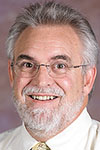Jeb Bladine: Looking forward to the power of qubits
One task in my first office job was longhand addition of numbers in lengthy columns on a legal pad, as we didn’t have digital calculators, much less computers. For more complex calculations, I used a slide rule.
Computers, spreadsheets and advanced programs revolutionized problem-solving, and not just in math, but in all phases of our lives. But today’s supercomputers, though able to manage incredibly complex systems, are mere toys compared to the promises of quantum computing.
This week, Google announced its experimental quantum computer took just 3 minutes and 20 seconds to perform a mathematical calculation that would require more than 10,000 years on a supercomputer.
Forget the space race. The world’s largest countries and companies are engaged in a quantum computing race with enormous implications for personal safety, national security and global supremacy.
John Martinis of Google reports, “We have built a new kind of computer based on some of the unusual capabilities of quantum mechanics. We are now at the stage of trying to make use of that power.”
Here’s a simplified introduction to quantum computers:
Traditional computers process “bits” of information, each representing a 1 or 0. Strung together — first in the thousands and now in the mega-billions — these data bits perform complex calculations and solve intricate problems.
About 20 years ago, researchers in Japan pioneered superconducting quantum bits, which required chilling viable metals to extremely low temperatures. Scientists have been attempting to harness the quantum bit, called a “qubit,” ever since.
As Cade Metz noted in the New York Times, “Qubits are fragile. Stringing even a few together can involve years of work … “
Qubits can store a combination of 1 and 0. And that double capacity allows computing power to grow exponentially.
It brings to mind my favorite mind-bending puzzle about the power of doubles:
Suppose I give you a penny on New Year’s Day, 2 cents on Jan. 2, 4 cents on Jan. 3 and continue doubling my donation to you every day. How much will you receive on Jan. 31, and what will your total gift be for the month?
Answer: After 10 days, you will have received just $10.23. But as my daily doubles continues, your Jan. 31 check for $10,737,418.24 would bring your total reward to $21,474,836.47!
“Imagine you had 100 perfect qubits,” said Dario Gil of IBM. “You would need to devote every atom of planet Earth to store bits to describe that state of that quantum computer.”
They say quantum computing advancements could halt hacking, ransomware and invasions of personal privacy. That alone would be worth the price of admission.









Comments